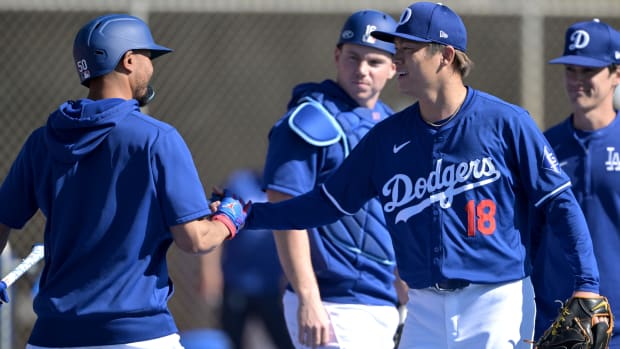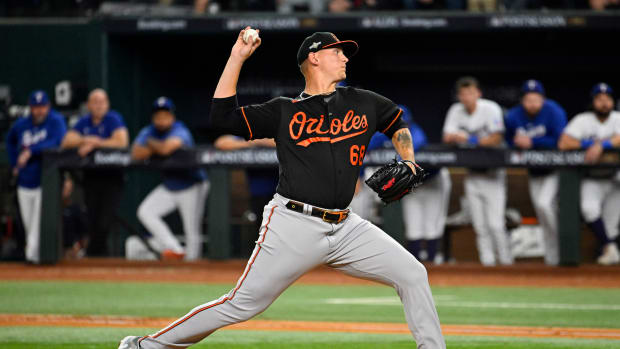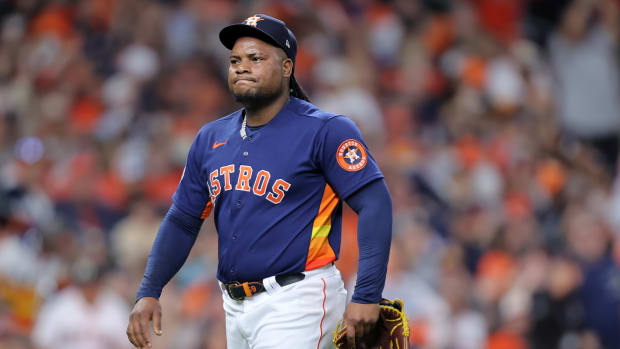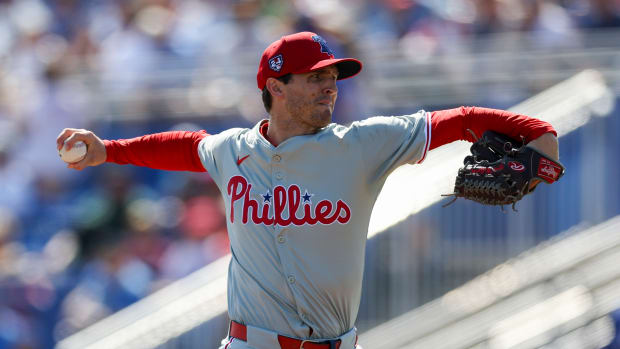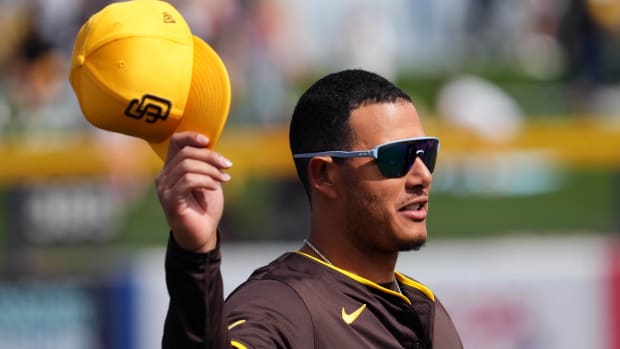Braves need shakeup as August skid threatens postseason hopes
On Wednesday afternoon, the Braves lost to the Mariners in Seattle, 7-3, thus completing a dubious sweep: An 0-8 West Coast road trip in which the Dodgers, Padres and Mariners ran the table against them. At 58-56, the defending NL East champions are now a season-high four games behind the Nationals and one game away from matching the franchise's longest losing streak since April 2010. Particularly when one considers some of manager Fredi Gonzalez’s recent lapses, it’s fair to wonder if complacency has taken hold.
No matter where one stakes the arbitrary endpoints, the splits are unflattering. Since jumping out to a 17-7 start through April 27, they're 41-49. Since June 1, when they were 31-25 and last had a three-game division lead, they're 27-31, with a lower winning percentage (.466) than the Cubs (28-30, .483) or Diamondbacks (26-29, .473) during that stretch, and a worse run differential (-8) than the Mets (27-31, +5) or Padres (26-30, +4). Since July 5, when a nine-game winning streak pushed them to a season-high 11 games above .500 at 49-38, they're 9-18, worse than any other NL team save the Rockies (8-17) despite being outscored by just 11 runs in that span. Since the All-Star break, they're 6-13, and of course, they're 0-for-August.
Overall, the Braves are just two games over .500, with a +3 run differential — the embodiment of mediocrity. Peek at their various Pythagorean records via the Baseball Prospectus Adjusted Standings, and it appears that they're lucky to be above .500 at all. They're 0.6 wins above their first-order record (based on runs scored and runs allowed), 2.4 wins above their second-order record (based on run elements — hits, walks, total bases, steals and the various flavors of outs) and 3.1 wins above their third-order record (the same, adjusted for the quality of the offenses and pitching they've faced); their winning percentages on the latter two fronts are just .488 and .481, respectively.
The larger share of the blame for Atlanta's overwhelming mediocrity can be laid at the feet of its offense. The Braves are 13th in the league in scoring (3.74 runs per game), a bit lower than one might expect given that their none-too-flattering batting line (.245/.309/.369), which places them ninth, ninth, and 12th in the league, respectively; more representatively, their 89 OPS+ is tied for 12th. They're underpowered (.124 isolated power, 11th but just three points shy of the bottom) and strikeout-prone (22.2 percent, third in the league) though not particularly unselective or unlucky; both their 7.9 percent walk rate and .301 batting average on balls in play rank sixth. They're not even particularly unclutch, with a 100 OPS+ with runners in scoring position and 99 in high-leverage situations, both around 10 percent better than we'd expect relative to their total offensive package.
For Nationals, Harper's slump provides problem with no easy answer
The lineup has multiple sinkholes. Although jettisoning Dan Uggla in favor of rookie Tommy La Stella has finally given them a solidly average offensive contributor at second base (.284/.362/.351, 101 OPS+), third baseman Chris Johnson (.276/.300/.386, 90 OPS+) and shortstop Andrelton Simmons (.249/.297/.340, 78 OPS+) have both been drags on the lineup, and centerfielderB.J. Upton (.212/.281/.327, 70 OPS+) has been abysmal. Even some of the team’s top hitters have been scuffling lately. Since the break, Freddie Freeman has hit .227/.301/.360 with two homers, and Evan Gattis is at .229/.315/.354 with one homer, offsetting a torrid streak by Jason Heyward (.396/.473/.542) and business as usual from Justin Upton (.294/.354/.500). The team as a whole is eking out just 3.37 runs per game in the second half, with Johnson the only other regular besides Heyward and Upton the Younger putting up an OPS above .680 in that span.
Those sinkholes are even deeper when one considers the dreadful defense of Johnson (-12 Defensive Runs Saved) and B.J. Upton (-11). Meanwhile, Freeman (-5), Gattis (-4) and La Stella have all been subpar, the latter level with Uggla (-2) once you adjust for playing time. All of that offsets the all-world defense — if the stats are to be believed — of Heyward (+28) and Simmons (+14); Ultimate Zone Rating puts those two at +24.6 and +8.2 runs, roughly in the same ballpark. As a whole, the Braves’ .680 defensive efficiency ranks 12th in the league, 11 points below average; similarly, their -4 DRS figure is 12th as well. The staff misses bats, but when the ball’s in play to anywhere but shortstop and rightfield, it doesn't end well.
At the very least, mothballing Replacement Level Killers Upton (-1.1 WAR) and Johnson (-0.9 WAR) would seem to be in order. But utilityman Emilio Bonifacio, acquired in a July 31 deal with the Cubs, has started just three games, one at each outfield position. No great hitter himself (.277/.319/.367 for an 89 OPS+ this year), Bonifacio has at least been better than the aforementioned pair with the lumber this year, and his career defensive numbers show him more or less average at both centerfield and third base. In other words, he could stop the bleeding at one of those positions if Gonzalez properly deployed him, but that would require sitting one player owed around $50 million through 2017 (Upton) or another owed around $25 million through 2017 (Johnson) — a reckoning that the manager and general manager Frank Wren have yet to show the stomach for.
On the run-prevention side, the Braves have been quite respectable for a team that lost two starters to Tommy John surgery (Kris Medlen and Brandon Beachy) and filled one of those spots with waiver-wire pickup Aaron Harang. Their 3.71 runs per game allowed ranks seventh in the league and their 108 ERA+ is tied for third. The rotation ranks fifth in ERA (3.44) and first in quality start rate (69 percent). From among the team’s current starting five — Harang, Julio Teheran, Ervin Santana, Alex Wood and Mike Minor — only the latter has an ERA above 3.59 or a quality start rate below 56 percent.
Awards Watch: NL Cy Young race now between Kershaw, Cueto, Wainwright
Alas, Minor has been dreadful, pitching to a 5.42 ERA while allowing 1.7 homers per nine. The 26-year-old lefty missed the first four weeks of the season due to shoulder inflammation, and while he made a solid showing for a stretch — posting a 3.07 ERA through his first seven starts — he’s been torched for a 7.33 ERA over his last 10, just three of which have been quality starts. One rule of thumb is that anytime your ERA can be mistaken for a Boeing model, it’s time for a break. So after Minor allowed five runs in five innings to the lowly Padres, Gonzalez announced that the team would skip his next turn and give him time to make adjustments in the bullpen.
That 'pen has been very good on the whole, with strikeout and homer rates (9.6 and 0.5 per nine, respectively) that both rank second in the league. Their 22 percent rate of allowing inherited runners to score is tied for third, and the bullpen's 3.28 ERA is fifth. Closer Craig Kimbrel and setup men Jordan Walden and David Carpenter all have strikeout rates of 11.2 per nine or above, and deadline acquisition James Russell represents a solid upgrade on Luis Avilan as a situational lefty.
But that bullpen’s recent deployment has been a big part of Atlanta's skid, and Gonzalez bears a significant amount of the blame for that. Three of the team's losses during the road trip from hell were walkoffs in extra innings: One to the Dodgers on July 30 and then two to the Padres on Aug. 2 and 3. Kimbrel’s only appearance during the entire trip came in the 11th and 12th innings of that Aug. 2 loss, when he walked three and allowed two hits in 1 1/3 innings. The Braves lost the other two of those games with rookie swingman David Hale — a pitcher walking 3.9 and striking out 4.2 per nine — on the mound. Asking Kimbrel to come back the day after he threw 38 pitches would have been a stretch, but there’s no reason he shouldn’t have been used in the first of those losses, or limited to eight batters faced during the entire eight-game stretch.
This is an ongoing problem for Gonzalez. As Grantland’s Jonah Keri noted back in May, "Since Opening Day 2013, the Braves have entered the ninth inning of road games tied 10 times. They’ve used Craig Kimbrel, arguably the best closer on the planet, exactly zero out of those 10 times." Recall that Gonzalez’s refusal to depart from bullpen orthodoxy by deploying Kimbrel in the eighth inning of an elimination game on the road played no small role in the team’s defeat by the Dodgers in last fall’s Division Series. Gonzalez would rather keep Kimbrel wrapped in mylar than let anybody get their greasy mitts on him.
The Braves are hardly licked yet, though in addition to being four games behind the Nationals, they’re now three back in the wild card race, tied with the Reds and behind the Pirates, Cardinals and Giants. The Baseball Prospectus Playoff Odds give them a 24.4 percent chance of reaching the playoffs — no longer locks but hardly outrageous longshots, more or less on par with the Yankees, Royals, Mariners and Reds in the grand scheme of things.
The team does have nine games left with Washington, whom they’ve beaten seven out of 10 times thus far, though that includes a 5-1 run from the season’s first two weeks. The two rivals face off in Atlanta for a three-game set starting on Friday. But if the Braves going to halt this skid and stay in the NL East race, now is the time, though it would certainly help if Gonzalez shook things up a bit.






























